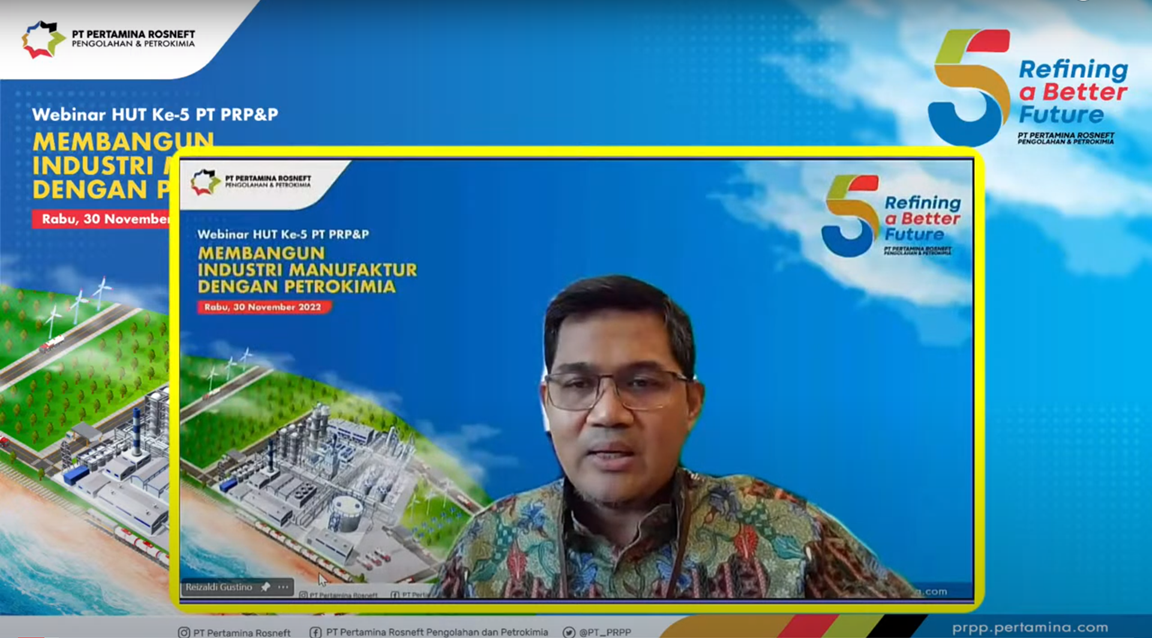Promising Prospects, Petrochemical Investment Estimated to Reach US$ 30 Billion

Jakarta, 3 Desember 2022 - The petrochemical industry is one of the leading industries that will become an economic buffer next year with an investment value of billions of dollars so it needs to get strong support from all policymakers (stakeholders). This is the conclusion of the webinar held by PT PRPP on Wednesday (30/11/2022).
The webinar with the theme "Building a Manufacturing Industry with Petrochemicals" is part of a series of events commemorating the 5th anniversary of PT PRPP. "Every year we hold webinars to increase our understanding and awareness of the petrochemical business, especially what PT PRPP is currently working on," said President Director of PT PRPP Reizaldi Gustino in his welcome speech.
Present as speakers at the webinar were Acting Director General of Chemical, Pharmaceutical and Textile Industry of the Ministry of Industry (Kemenperin) Ignatius Warsito, Director of Business Development of the Indonesian Olefin, Aromatic, and Plastic Industry Association (Inaplas) Budi Susanto, and Executive Director of the Institute for Development of Economics and Finance (Indef) Tauhid Ahmad.
Reizaldi said the upstream petrochemical industry is one of the ten basic chemical industries based on oil and gas and coal that are the focus of national industrial development. Currently, PT PRPP has a mandate or mandate to run the Tuban Grass Root Refinery (GRR) project, which is one of the National Strategic Projects. This is related to the large import value of plastic products and derivatives in Indonesia which reached US$ 8.7 billion as of September 2022.
"With the development of the upstream petrochemical industry, it is hoped that the industries on it including its supporters from capital goods, helpers, including the flagship industry will all be encouraged by the development of the petrochemical industry. Maybe in the next few years until 2030 we have a portfolio of projects, both in the Pertamina Group and the private sector, the value reaches US $ 30 billion and there is an addition of 7 million tons per year of upstream petrochemical products, mainly polypropylene and polyethylene," said Reizaldi.
Ignatius Warsito said the government is trying to build national petrochemical independence, both in the upstream, intermediate and downstream sectors, especially amid the risk of an economic crisis next year. It will encourage the national petrochemical industry to work on the domestic market, before working on the petrochemical export market.
"This is good for maintaining security and comfort in the event of a global economic crisis or an unsupportive situation. The Ministry of Industry is very happy, fully supporting the presence of the GRR Tuban megaproject so that we can stand on our own feet despite the challenges in 2023 by anticipating and mitigating the global economic crisis. I am confident and believe that by working together, this common ideal will be realized," said Warsito.
Budi Susanto positively welcomed the progress of the construction of the Tuban GRR project which is expected to be the largest in Southeast Asia, considering the large demand for petrochemical products in the country as can be seen from the large imports of these products per year.
"In 2021, polyethylene (PE) still has imports of around 770,000 tons or 42% of the total plastic demand. Polypropylene (PP) is even higher, there are still (imports) of 1.1 million tons or about 58%. Despite the pandemic, it turns out that the demand for plastic, especially PE and PP, is still high. So PRPP friends, you come in just in time," he said.
He also hopes that PT PRPP can realize an integrated national petrochemical industry by producing and supplying naphtha. "It must be one of the integrated petrochemical industries not only refinery and petrochemicals in Tuban but must be intertwined and intertwined with petrochemicals in Banten, because they do not have naphtha while you (PT PRPP) have naphtha."
On the other hand, Executive Director of the Institute for Development of Economics and Finance (Indef) Tauhid Ahmad assessed that the prospects for the petrochemical industry are very large with stable growth. As of the third quarter of 2022, the growth of the chemical industry averages 7-8%. The need for ethylene, polyethylene, propylene, and polypropylene alone increases by an average of 3.5% per year until 2045, thus opening up opportunities to work on the domestic market.
Related to that, he reminded the need to secure raw materials so as not to interfere with the production process in the future. Likewise with the need to secure competitiveness. Indef suggested the government suspend the plan to exempt import duties on imported petrochemical products, in line with efforts to strengthen the national petrochemical industry.
"I am intrigued about the plan to exempt import duties, this must be studied more deeply. Is the plan backfired on our industry, because of the high importation trend, will this weaken our petrochemical competitiveness?" concluded Tauhid.*

News Highlight








